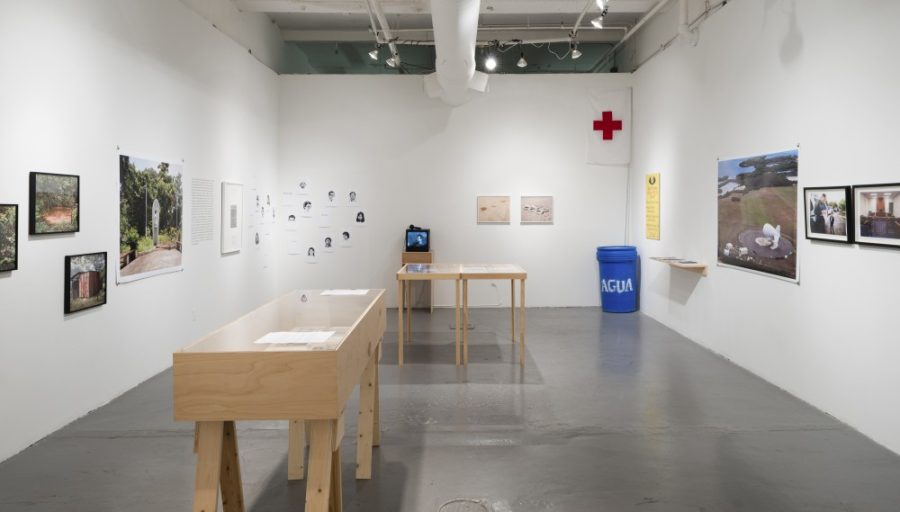The UA Museum of Art has a new exhibition showcasing the Borderland Collective’s art “Northern Triangle,” led by artists Mark Menjivar and Jason Reed, as well as the exhibition “Resilient Voices: The Art of David Tineo.”
The exhibition runs from Feb. 2. through April 2. at the museum. Reed and Menjivar are both art professors from Texas State University. They have been with the “Northern Triangle” exhibition since 2014, traveling to cities from their home state of Texas to Illinois and now to Arizona, and then to Portland when this exhibition moves forward.
RELATED: Museum of Art reveals the science of art conservation
The exhibition is currently supported by the UA Department of Mexican American Studies, the UA Center for Latin American Studies and the nonprofit Chicanos Por La Causa.
Jeremy Carter, director of development for Southeast Arizona Chicanos por la Causa, said the exhibition was a great fit for the organization.
“if you look at the heart of the issues concerning us now as a group, it is now so important to address the issues of resilience and migrating somewhere in hopes of a better future for ourselves and a better future for our children, and those messages are very important in today’s culture,” Carter said.
Tineo’s “Resilient Voices” exhibition on the diversity and inclusivity of society reflects on his take on the barriers one has to face in real life and also within themselves.
RELATED: ‘Border Dynamics’: One of UA’s massive public art collections
Tineo, an artist and UA alumnus, said he is honored to be here.
“There is no greater joy for me to see that in my own hometown that I have this opportunity to show this exhibition,” Tineo said.
Menjivar and Reed’s exhibition focuses on U.S. intervention over the past 100 years in Central America and how it relates to the refugee crisis happening at the border now. Their work is a collective of different types of media, such as photographs, maps, videos, sounds, archival documents and drawings made by artists and made by children who were in detention centers.
The “Northern Triangle” exhibition focuses on the historical and real world aspects surrounding border issues, with the history of people being an important part of what is displayed.

Menjivar and Reed usually do their showcasing in classrooms, but they decided to take the classroom to the galleries and museums, somewhat like an archive, where students and community members can come and look at all the material and engage in dialogue within the space.
“I hope that when they come in they will be able to recognize the complexity of the issues around immigration and U.S intervention, and that when they leave here that this exhibition will just be a starting point for them to reflect on things in a deeper way,” Menjivar said.
Menjivar and Reed are also doing a separate project that is part of an exhibition called “Migration Stories,” an oral history project that looks at where we come from and how we’ve arrived at our current location.
Menjivar said all of us have a migration story, some of them are just closer than others. He lived in El Salvador during the country’s civil war and Reed said he grew up in west Texas a few hours north of the border.
“Migration Stories” will run until April 2 from noon to 5:30 p.m. at the UA Museum of Art and will encourage students and community members to share their migration story.
Reed and Menjivar are interested in starting discussions of complex issues like borders, immigration, energy and capital punishment, and how we as a collective are supposed to talk about these complex issues.
Menjivar said we currently are finding ourselves in a political climate where these issues that we address in this exhibition are incredibly important.
Menjivar also gave advice for those who are refugees and immigrants who attend the exhibition.
“I mean, first things first is to be kind and gentle to yourself and recognize that these issues are real and that I hope when people come in, that they can find a place to hang their own stories in this exhibition, but that also that there is help for individuals,” Menjivar said.
Follow David Pujol on Twitter.









